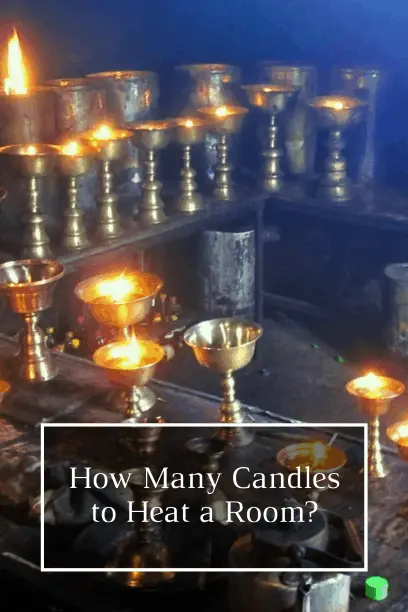Even though people all over the world today benefit from electricity as their main source of illumination, candles still play an important role. During times of power outage, a candle is still one of the best things to have around. Emergency lights are helpful of course but they too run out of juice sooner or later.
Apart from this scenario, some also use candles to heat the room. Can candles heat a room if you have enough of them? That is an important question to ask yourself especially if you plan to light a lot of candles inside.
The answer is yes, you can definitely heat a room using candles. However, the number of candles it would require to produce noticeable heat would end up being a potentially big fire hazard. While technically it can, it would be very unwise to do so.
There are a few variables you need to consider such as the size of the room and how much heat an individual candle can produce. By doing the necessary calculations, you will be able to figure out the optimum number of candles to use before they start increasing the room temperature.
Table of Contents
Can Candles Heat a Room if You Have Enough of Them?
Most candles are petroleum-based to help with getting lit efficiently. A modern candle burns at a steady rate of 0.1 g/m where it roughly releases 80W or 273 BTU/h. The wax used in the candles consists of approximately 37 kilojoules of energy per gram.
With 20 candles, one can produce about 1600W which will heat a room that is approximately 300 square feet. However, lighting up 20 candles can also be very dangerous as it is a fire hazard.
There are ways to minimize risks but even then it won’t completely be safe for you to light so many candles. If you do so, you have to always make sure that you are never out of sight to prevent your home from catching on fire.
How to Calculate The Number of Candles Needed to Heat a Room

To do the actual calculation, you first need to look at the heating power of a single candle which is about 80W or 273 BTUs. 1 W = 3.41 BTU.
Then, you need to calculate the size of the room. Here are three methods of doing so:
- If it’s a rectangular room, multiply the length of the room by its width.
- If it’s a triangular room, multiply the length and width and then divide it by 2.
- If you have a circular room, then measure its radius, square the result and then multiply it with 3.14.
Once you have calculated the square footage of the room, multiply it with 20 BTUs to get a rough estimate. This will vary based on the climate zone you live in, exposure to sunlight and the number of people living in your home as every one of us generates body heat. However, 20 BTUs per square foot is what you usually look for when it comes to generating heat.
For instance, if the size of the room is 500 square feet, then multiply it by 20 and you will get 10,000 BTU/h. Then divide 10,000 by 273 and you get 36 which is the number of candles it will take to heat that room. For a 1000 square feet room, you would need 74 candles to heat the room.
Keep in mind, to get the exact number there are many variables you need to consider, and doing that will be incredibly difficult as the temperature can change, more people might enter the room, etc.
The above calculations were also done keeping normal candles in mind. Other types of candles such as tea candles generate significantly less heat (30W approx.).
Increasing 1 Degree of Room Temperature with a Candle
If you take a small room that is 2 x 3 x 2.5 m with a heat resistance of 3 K/J/m2, a surface area of 37m2, and an external temperature of 20 degrees, then the room will leak about 246W (37 x 20/3) which is the equivalent of roughly 3 candles. So just to keep the room temperature the same, you would need the heat from 3 candles.
If you need to increase the temperature by one degree in this scenario, then the amount of heat loss would be 37 x 20/3, which is about 260W. Therefore, you would need 3 candles to maintain the current temperature and another 3.6 or 4 candles to increase the temperature by a single degree here.
If you measure the size of your room and its heat resistance, you can do the same calculation above to know the approximate number of candles you will need to raise the temperature by 1 degree.
How many candles does it take to heat a 2 x 3 x 2.5 m (50 Square Foot) room:
| Temperature | Candles |
|---|---|
| +0 | 3 |
| +1 | 7 |
| +2 | 10 |
| +3 | 14 |
| +4 | 17 |
| +5 | 21 |
| +6 | 25 |
| +7 | 28 |
| +8 | 32 |
| +9 | 35 |
For a rough estimate on how many candles you need to heat your room by one degree, take the square footage of your room and divide it by 50. Take that number and multiply it by the number on the chart above.
For example, to maintain the heat of a 1,000 square foot room, you would do 1,000/50 = 20. Then 20 x 3 = 60 candles.
That is assuming the larger room leaks heat similar to the smaller room but scaled by 20 in this scenario. This probably won’t be the case so for a more accurate estimate you would need to find your rooms heat resistance and external temperature.
Are Lighting Candles an Efficient Solution for Generating Heat Indoors?
Lighting candles are not an efficient solution for generating heat indoors. The primary function of a candle is to provide illumination and should be used only for that purpose. Is it technically possible? Yes. Is it safe and efficient? No, it isn’t.
From the above calculations, you would need 36 candles to heat a 500 square foot room, and that too under ideal conditions. The amount of heat felt in the room from candles will depend on a wide variety of factors such as the level of insulation in the room, the outside temperature, number of people in the room, the type of walls, and more.
Another thing to keep in mind is that candles offer directional heat. The heat will always travel upwards of the candle rather than a heater that will spread it more evenly throughout the room. Hence it will take some time before you feel any significant change in the temperature.
On top of all the above, having 50 or 80 candles inside a single room is an easy formula for disaster. If one of them accidentally falls on any flammable objects, your entire home may burn down. To prevent this, you will have to constantly be nearby and ensure that the candles are properly kept.
Conclusion
While it is possible to heat a room with candles, their relatively low heating power and unidirectional heat generation makes them inefficient when used as a heating source. The bigger the room, the more candles you will need and this will easily become a fire hazard before you know it. You can use clay pots to alleviate some of the risks but using alternate sources of heat will always be wiser and more efficient.

